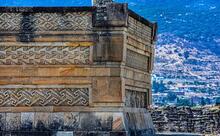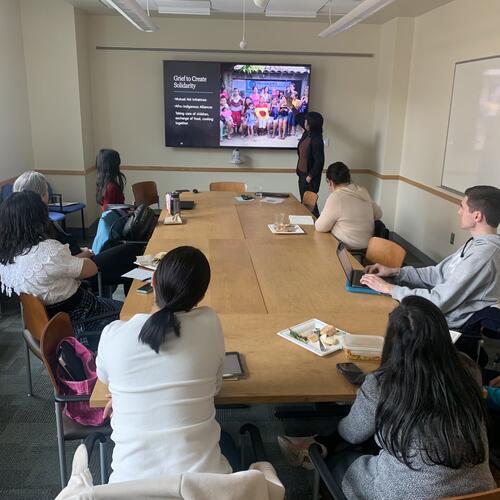CLAIS Colloquium Explores Grief and Resistance as Responses to Environmental Racism in Oaxaca, Mexico

On Wednesday, March 1, a group of students, faculty, and staff gathered to attend a presentation by Meztli Yoalli Rodríguez Aguilera, the latest installment of the CLAIS Colloquia Series. The presentation was titled “Mestizo Geographies: Race, Gender, and Environment in Oaxaca” and was the result of months of fieldwork that Rodríguez Aguilera conducted in Costa Chica in Oaxaca, Mexico.
The region is home to large communities of Afro-Indigenous people whose unique experiences of ecocide and environmental racism inform Rodríguez Aguilera’s central research questions: - What are the emotional-bodily effects of environmental racism in Afro-Indigenous communities? - What are the practices of survival used by Black and Indigenous women facing human and non-human death in Mexico? Before presenting the results of their fieldwork, Rodríguez Aguilera gave an overview of the ideology of “mestizaje” that is embedded in much of Mexican society.

As Rodríguez Aguilera explained, mestizaje is an aesthetic eugenics project that promotes a narrative of “racial harmony” in Latin America while obscuring violence done to people of color by white people. Rodríguez Aguilera introduced José Vasconcelos’ 1925 book La raza cósmica, in which Vasconcelos not only promotes the ideology of mestizaje but also uses it to support colonial notions of land ownership. This connection informs Rodríguez Aguilera’s articulation of “mestizo geographies,” which they define as “mestizaje’s material consequences wherein Black, Indigenous, and non-white people and territories are dispossessed and displaced through pollution, tourism, extractivism, and toxicity.”
After establishing this social-historical context of eugenics and racial violence, Rodríguez Aguilera went into further detail about their fieldwork. Using an “activist research methodology,” they collaborated with Afro-Indigenous communities in Costa Chica for 14 months (2017-2019) following an earthquake that had released toxic gasses into local lagoons. Although the earthquake itself was disastrous, it was compounded by breakwaters that the government had constructed to attract tourism with the unintended effect of cutting off flows of oxygen and water between the ocean and the lagoons.
Environmental disaster and government interference combined to poison the water and fish upon which local communities depend for survival. Through a combination of interviews, body-mapping, observations, and other ethnographic methods, Rodríguez Aguilera found that Afro-Indigenous people in Costa Chica engaged in multiple forms of survival and resistance fueled by grief. Even as they grieved the damaging of intimate relationships between and among people and lagoons, the community also mobilized to protest in government offices, promote mutual aid initiatives, and clean garbage from lagoons. Overall, grief presented itself in Rodríguez Aguilera’s research not only as an emotion that is experienced bodily and ancestrally but also as a motivation for many “illegible forms of politics.” After the presentation, Rodríguez Aguilera answered a variety of questions from audience members. Some attendees were interested to know more about the healing power of grief. Others asked about a specific study that Costa Chica residents were conducting about mussels in the lagoon. Still others asked about Rodríguez Aguilera’s methods and how they built relationships of trust with the community they were studying.
If you are interested in attending future colloquia and other CLAIS events, please check out CLAIS’ website, and Twitter, Instagram, and Facebook pages!
By Charlie Mayock-Bradley, CLAIS Student Assistant
